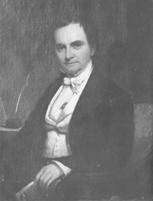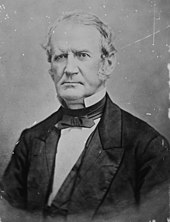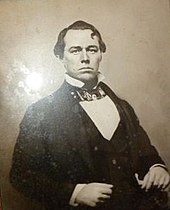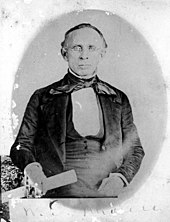North Carolina General Assembly of 1835
The North Carolina General Assembly of 1835Raleigh from November 16, 1835 to December 22, 1835. The assembly consisted of the 137 members of the North Carolina House of Commons and 65 senators of North Carolina Senate elected by the voters in August 1835. This was the last assembly elected before the amendments to the Constitution of North Carolina from the North Carolina Constitutional Convention of 1835 took effect. Thus, the House of Commons included representatives from towns (also called Districts) and the number of members of the house was greater than 120. William H. Haywood, Jr was elected speaker of the House of Commons and Charles Manley was elected clerk. William D. Mosely was elected President of the Senate and William J. Cowan was elected Clerk. Richard Dobbs Spaight, Jr. was elected the Governor by the assembly and served from December 10, 1835 to December 31, 1836. He was the last governor of North Carolina to be elected by the General Assembly.[ 1] [ 2] [ 3] [ 4] [ 5] [ 6] [ 7]
Councilors of State
The General Assembly elected the following individuals to the Council of State on December 4, 1835:[ 6]
Allen Rogers, Wake County (elected President of the Council)
Thomas B. Haywood (elected Secretary of the Council)
William Shepperd Ashe , New Hanover CountyPeter H. Dillard, Rockingham County
Louis D. Henry, Cumberland County[ note 1]
Henry Skinner, Perquimans County
Daniel Turner , Warren County[ 8] George Williamson, Caswell County William Hill continued to serve as the North Carolina Secretary of State [ 9] Samuel F. Patterson was elected by the assembly to serve as North Carolina State Treasurer in 1835. John Reeves Jones Daniel was elected to serve as North Carolina Attorney General .
Membership of the assembly
House of Commons members
Speaker of the House of Commons William Henry Haywood, Jr Rep. William Alexander Graham Rep. Owen Rand Kenan Rep. Kenneth Rayner Edward Bishop Dudley There were 137 delegates in the House of Commons, two from each of the 65 counties and one from each of the seven towns/Districts. They elected William H. Haywood, Jr. from Wake County as their Speaker and Charles Manly from Wake County as their Clerk.[ 3] [ 1] [ 2] [ 6]
Senate members
Sen. William Dunn Moseley There were 65 Senators in the Senate, one from each of the 65 counties in North Carolina.[ 4] [ 1] [ 2]
County/Town
Senator
Anson
Alexander Little
Ashe
John Gambill
Beaufort
James O'Kelly Williams
Bertie
Alexander W. Mebane
Bladen
George Cromartie
Brunswick
Frederick Jones Hill [ 13]
Buncombe
Hodge Rabun
Burke
Peter Ballew
Cabarrus
David Long
Camden
Thomas Tillett
Carteret
James West Bryan [ 14]
Caswell
James Kerr
Chatham
Hugh McQueen
Chowan
William Bullock
Columbus
Caleb Stephens
Craven
Thomas J. Pasteur
Cumberland
Duncan McCormick
Currituck
Daniel Lindsay, Jr.
Davidson
John A. Hogan
Duplin
John E. Hussey
Edgecombe
Benjamin Sharpe
Franklin
Henry G. Williams
Gates
William W. Cowper
Granville
James Wyche
Greene
Wyatt Moye
Guilford
James T. Morehead
Halifax
Andrew Joyner [ 15]
Haywood
Ninian Edmonston
Hertford
John Vann
Hyde
William Selby
Iredell
John M. Young
Johnston
Josiah Houlder
Jones
James Harrison
Lenoir
William Dunn Moseley [ 16]
Lincoln
John B. Harry
Macon
Benjamin S. Brittain
Martin
Jesse Cooper
Mecklenburg
Stephen Fox
Montgomery
Reuben Kendall
Moore
Cornelius Dowd
Nash
Samuel L. Arrington
New Hanover
Louis H. Marsteller
Northampton
William Moody
Onslow
David W. Simmons
Orange
Joseph Allison
Pasquotank
Frederick Whitehurst
Perquimans
Jesse Wilson
Person
Isham Edwards
Pitt
Alfred Moye
Randolph
Alfred Staley
Richmond
Alexander Martin
Robeson
Malcolm Patterson
Rockingham
David S. Reid
Rowan
Thomas Gilchrist Polk [ 17]
Rutherford
Alanson W. Moore
Sampson
Edward C. Gavin
Stokes
Matthew R. Moore
Surry
Harrison M. Waugh
Tyrrell
George H. Alexander
Wake
Samuel Whitaker
Warren
Weldon Nathaniel Edwards [ 18]
Washington
John B. Beasley
Wayne
John Exum
Wilkes
James Wellborn/Welborn [ 19]
Yancey
Thomas Baker
Acts passed by the assembly
The following acts were passed by this General Assembly:[ 20]
Implementation of the new election procedures enacted in the constitution convention, including duties of the sheriffs
Suppression of the vice of gambling in the state
Disposition of un-surveyed Cherokee lands in Haywood and Macon Counties
Various acts dealing with Banks, the poor, hawking and peddling, county registers, and veteran seamen
Completion of the construction of the state capital
Chartering of railroad companies in the state
Regulation of slavery
Regulation of the state militia
Incorporation of schools
See also
Notes
^ Louis D. Henry resigned on July 16, 1836
^ Edward Bishop Dudley is referred to as Edward M. Dudley in some references.
References
^ a b c Connor, R.D.D. (1913). A Manual of North Carolina (PDF) . Raleigh: North Carolina Historical Commission. Retrieved April 27, 2019 . ^ a b c Wheeler, John Hill (1874). "The Legislative Manual and Political Register of the State of North Carolina" . google.com . Retrieved April 9, 2019 . ^ a b Lewis, J.D. "North Carolina State House 1835" . The American Revolution in North Carolina . Retrieved April 17, 2019 . ^ a b Lewis, J.D. "North Carolina State Senators 1835" . The American Revolution in North Carolina . Retrieved April 17, 2019 . ^ Norris, David A. (2006). "North Carolina Capitals, Colonial and State" . NCPedia.org . Retrieved September 4, 2019 . ^ a b c Cheney, John L. Jr. (1974). North Carolina Government, 1585–1974 ^ Journal of the Senate and House of Commons of the General Assembly of the State of North Carolina at the Session of 1835 . Retrieved November 7, 2019 .^ Mcfarland, Daniel M. (1996). "Daniel Turner" . NCPEDIA . Retrieved November 8, 2019 . ^ York, Maury (1988). "William Hill" . NCPedia . Retrieved October 5, 2019 . ^ Bell, John L. Jr. (1986). "Ralph Gorrell" . NCPEDIA . Retrieved November 8, 2019 . ^ Howerton, Timothy L. (1994). "Alfred M. Slade" . NCPEDIA . Retrieved November 8, 2019 . ^ McFarland, Daniel M. (1986). "Edward Bishop Dudley" . NCPEDIA . Retrieved November 8, 2019 . ^ London, Lawrence F. (1988). "Fredrick Jones Hill" . NCPEDIA . Retrieved November 8, 2019 . ^ Carroway, Gertrude S. (1979). "James West Bryan" . NCPedia . ^ Murphy, Eva (1968). "Andrew Joyner" . NCPedia . ^ Powell, William S. (1991). "William Dunn Moseley" . NCPedia . Retrieved September 23, 2019 . ^ Kirkman, Roger N. (1994). "Thomas Gilchrist Polk" . NCPedia.com . Retrieved September 23, 2019 . ^ McFarland, Daniel M. (1986). "Nathaniel Weldon Edwards" . NCPEDIA . Retrieved November 5, 2019 . ^ Powell, William S. (1996). "James Welborn" . NCPEDIA . Retrieved November 8, 2019 . ^ Spaight, Richard D. (1836). Acts passed by the General Assembly of the State of North Carolina by the Session of 1835 . Retrieved November 8, 2019 .
List of North Carolina state legislatures Senate President pro tempore of the Senate House of Commons Speakers of the House of Representatives (see Note)Other Conventions Provincial Congresses and Constitution North Carolina Provincial Congress (1774–1776:
1st ,
2nd ,
3rd ,
4th ,
5th ),
Constitution of North Carolina (1776,
1835 Convention , 1861 Convention, 1868 redraft, 1875 Convention, Constitution of 1971)
Notes: Prior to the Constitution of 1868: the lower house of the North Carolina Legislature was known as the House of Commons and the leader of the Senate was called the Speaker of the Senate.





